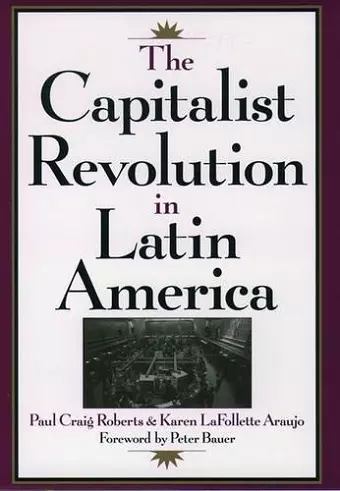The Capitalist Revolution in Latin America
Paul Craig Roberts author Karen Lafollette Araujo author
Format:Hardback
Publisher:Oxford University Press Inc
Published:1st May '97
Currently unavailable, and unfortunately no date known when it will be back

The political and social upheavals that have transformed the economies of Eastern Europe and the former Soviet Union during the past ten years have sparked considerable interest and speculation on the part of Western observers. Less noted, though hardly less dramatic, has been the revolutionary spread of free market capitalism throughout much of Latin America during the same period. In a wide-ranging survey that illuminates both the history and present business climate of the region, Paul Roberts and Karen Araujo describe the economic transformation currently taking place in Latin America. And as they do so, they also reexamine many of the prevailing orthodoxies concerning international development and the regulation of markets, and point to the success of privatization and free enterprise in Mexico, Argentina, and Chile as harbingers of the economic future for both hemispheres. The potential strength of the economies of Central and South America has always been obvious, the authors point out. Abundant natural resources, combined with vast expanses of fertile land and a sophisticated and relatively cohesive social culture, are found throughout the region. But the authors show that the Latin American nations were slow to discard the economic and social climate that they had inherited from their Spanish colonial masters, who had ruled by selling government jobs--creating a network of privilege--and by suppressing through over-regulation the development of markets for goods, services, and capital. The prevalent cultural attitude in Latin America was hostile to commerce, trade, and work--indeed, it was more socially acceptable to court government privilege than to compete in markets. The authors further show that U.S. aid packages to the region actually reinforced this culture of privilege and further hampered the growth of a free economy. Not until the 1980s did the picture begin to change, largely in response to the economic crises brought on through catastrophic national debts and hyperinflation. The book describes the efforts of the Salinas, Pinochet, and Menem governments to combat the established interests of the local elites and the international development agencies, to privatized state industries, and to established independent markets. In this new climate, private capitalists and entrepreneurs are feted and celebrated, and productivity has risen to levels unimagined only a few years before. But this dramatic economic turnaround, the authors show, is...
Lessons from socialist failures have been learned more quickly in Latin America than in Europe or the United States. This book lays out the record of Latin American accomplishments to date, along with a precautionary assessment of near-term prospects. * James M. Buchanan, Nobel Laureate in Economics, 1986 *
A compelling blend of substance and ideas - illuminates the "why" of revolution in economies in Latin America - and elsewhere - and the need for revolution in the multilateral financial institutions - Readable and rewarding. * George P. Shultz, Stanford University *
a wealth of economic detail and a fascinating summary of the statist history out of which Latin America's rent-seeking culture grew * Edward Schumacher, Wall Street Journal (Europe) *
ISBN: 9780195111767
Dimensions: 244mm x 163mm x 23mm
Weight: 508g
224 pages